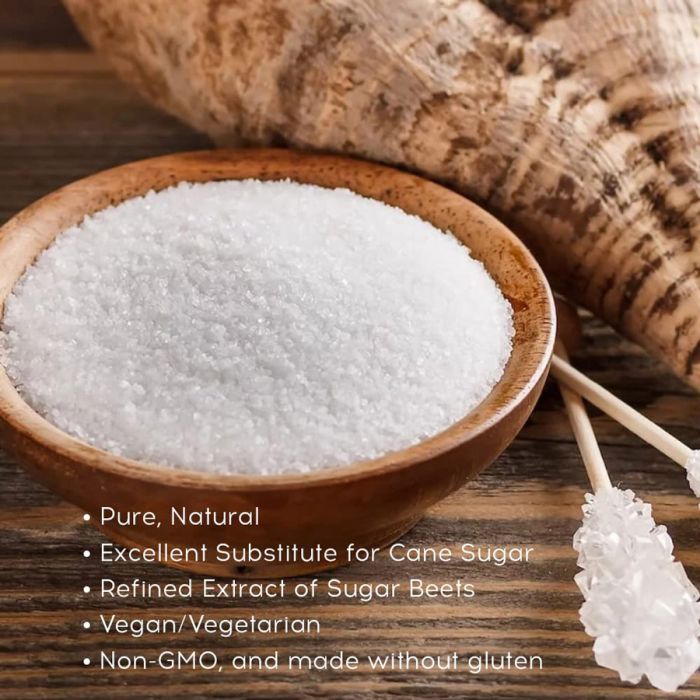The discussion of beet sugar vs cane sugar often includes comparisons of their glycemic index.
The discussion of beet sugar vs cane sugar often includes comparisons of their glycemic index.
Blog Article
Exploring the Differences in Uses and Advantages In Between Beet Sugar Vs Cane Sugar
In the culinary world, the selection in between beet sugar and cane sugar is not simply about sweet taste but entails a nuanced factor to consider of flavor, application, and influence. While both sugars originate from various plants, each undergoes one-of-a-kind production processes that subtly influence their features and viability for different dishes. As chefs and customers significantly prioritize both the environmental and taste accounts of their active ingredients, recognizing these differences comes to be critical. This exploration uses insight into exactly how each sugar type can best improve cooking developments.
Origins and Manufacturing Procedures of Beet and Cane Sugar

Walking cane sugar, on the other hand, comes from the sugarcane plant, an exotic yard native to Southeast Asia now grown in tropical zones worldwide. The production of cane sugar begins with the harvesting of cane stalks, which are squashed to launch the juice. This juice is then boiled to concentrate it, after which it is rotated in centrifuges to produce raw sugar crystals. These crystals are additional improved to produce the white sugar typically offered in shops.

Nutritional Content and Wellness Considerations

When contrasting the nutritional material of beet sugar and cane sugar, it becomes evident that both kinds basically give the very same caloric values, with around 16 calories per tsp and no considerable nutrient diversity. Both sugars, when consumed in excess, can add to elevated blood glucose degrees, a risk factor for diabetic issues and various other metabolic problems. From a wellness perspective, regulating intake of any kind of kind of sugar, whether from beet or cane, is recommended to avoid these possible unfavorable effects on well-being.
Taste Accounts and Culinary Applications
Despite their similar chemical frameworks, beet sugar and cane sugar vary discreetly in flavor, which can influence their usage in different cooking contexts. Walking cane sugar often lugs a hint of molasses, even in its refined form, providing a cozy, caramel-like touch that enhances baked products, coffee, and chocolate-based recipes. On the various other hand, beet sugar is identified by its very improved, neutral preference, making it a versatile sweetener that does not alter the flavor profiles of dishes.
Environmental Effect and Sustainability
While both beet and cane sugars are originated from plants, their environmental impacts differ considerably because of the unique techniques of growing and processing required for each. Sugar beet cultivation commonly entails considerable automation, which can raise fossil gas intake and carbon exhausts. Nevertheless, beets can be grown in cooler climates and call for much less watering, possibly reducing water use contrasted to sugarcane. Sugarcane, on the other hand, is normally expanded in tropical regions where it counts greatly on irrigation and a longer growing duration, enhancing its water footprint.
Additionally, the handling of sugarcane typically creates a substantial amount of waste, consisting of bagasse, which, although functional as biofuel, frequently contributes to air contamination if shed inefficiently. Sugar beet handling makes use of even more of the raw materials, causing less waste. Both industries face obstacles in decreasing their environmental footprints, yet continuous innovations in farming practices her comment is here and waste administration are intending to improve sustainability.
Economic Variables Influencing the Sugar Market
The financial characteristics of the sugar sector are considerably affected by international market demands and trade policies. Variables such as tolls, aids, and international trade contracts play important duties fit the affordable landscape. For instance, in regions where sugarcane or sugar beet production is subsidized, producers may have check these guys out a monetary benefit that allows them to supply reduced rates on the global market. This can produce variations in earnings and market accessibility for manufacturers in nations without such aids.
Furthermore, changes in global demand for sugar, affected by nutritional patterns and industrial usage in food items, directly impact prices and manufacturing degrees. beet sugar vs cane sugar. Weather also play a pivotal duty, as they can dramatically impact crop returns and, consequently, the supply chain. This variability presents a level of economic unpredictability that can cause investment volatility in sugar production fields, affecting decisions from growing to market method
Final Thought
In final thought, both beet and cane sugar have unique high qualities that suit different cooking needs. While cane sugar conveys a rich flavor perfect for boosting baked goods, beet sugar's nonpartisanship is ideal for lighter website here recipes.
Report this page